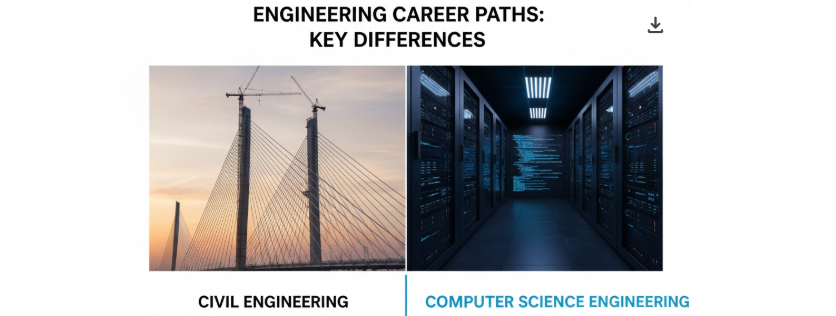Civil Engineering vs Computer Science Engineering: Since Civil Engineering (CE) and Computer Science Engineering (CSE) are fundamentally different from one another, your choice must be in line with your hobbies, ideal workplace, and financial objectives. The design, planning, and construction of vital infrastructure, such as roads, bridges, and buildings, are all part of civil engineering, which is focused on the real world. This route frequently results in employment in consulting businesses or the public sector, offering a steady career with excellent job security, particularly after obtaining certification and experience.
Although initial pay may be low and the task may require a lot of time spent on actual construction sites, CE graduates eventually gain value.On the other hand, algorithms, software development, data science, and artificial intelligence are the core areas of focus for Computer Science Engineering. Rapid innovation is the hallmark of this area, which, especially in the private tech sector, usually offers far better beginning pay and greater worldwide mobility straight out of college.
However, the CSE industry is fiercely competitive and frequently necessitates ongoing education to stay current with emerging technology, which can occasionally result in longer workdays or times of market turbulence. In the end, pick civil engineering if stability and concrete, large-scale projects appeal to you. Computer science engineering is the more obvious choice if you like abstract problem-solving, coding, great income potential, and a desk-based workplace.
Civil Engineering vs. Computer Science Engineering: Career opportunities
The engineering subject you choose will mostly depend on your interests and professional objectives. The employment prospects of computer science engineering (CSE) and civil engineering (CE) are contrasted here.
| Feature | Civil Engineering (CE) | Computer Science Engineering (CSE) |
| Focus Area | Physical world; design, construction, and maintenance of infrastructure (roads, bridges, dams, buildings). | Digital world; software development, algorithms, data science, artificial intelligence, and cybersecurity. |
| Common Job Roles | Structural Engineer, Construction Manager, Transportation Engineer, Geotechnical Engineer, Urban Planner. | Software Developer/Engineer, Data Scientist, Web Developer, AI/ML Engineer, Database Administrator. |
| Primary Work Environment | Often involves site visits, outdoor work, project management, and government/consulting offices. | Typically desk-based, indoors (AC offices), with options for remote/hybrid work. |
| Starting Salary Potential | Generally lower to moderate; substantial growth depends on licensure (like PE) and years of experience. | Generally significantly higher; competitive starting packages, especially in the private tech sector (FAANG/MNCs). |
| Long-Term Earning | Salary growth is steady and continuous; value increases significantly with experience and expertise (10+ years). | Very high potential for top earners, but salary can plateau if skills aren't continuously updated; highly volatile market. |
| Job Security & Stability | High, particularly in the Government/Public Sector (PSUs) and essential infrastructure projects; evergreen demand. | Can be highly market-dependent (booms and layoffs); strong skills provide security, but competition is fierce. |
| Government Sector Scope | Excellent scope; numerous vacancies in state and central government bodies (e.g., PWD, Railways, PSU recruitment via GATE/ESE). | Limited scope; fewer direct recruitment opportunities compared to CE, mainly in defense and specialized IT departments. |
| Continuous Learning | Required for professional development and licensing; often tied to construction materials, safety, and project management standards. | Extremely high; essential to constantly learn new languages, frameworks, and technologies to remain relevant. |
Civil Engineering vs. Computer Science Engineering: Key Differences

These are the main distinctions between Computer Science Engineering (CSE) and Civil Engineering (CE):
Civil Engineering (CE)
-
Emphasis on Physical Infrastructure: CE prioritizes safety and structural integrity while designing and overseeing concrete, large-scale projects like buildings, bridges, and water systems.
-
Outdoor/Site-Based Work: In contrast to an office setting, work frequently necessitates site visits, outdoor supervision, and project management.
-
Stability and Public Service: Provides career stability with slower, consistent growth, frequently through government posts (PSUs) and crucial infrastructure consultancies.
Computer Science Engineering (CSE)
-
Emphasis on Digital Systems: CSE deals with abstract and logical systems by developing and managing software, algorithms, data structures, and artificial intelligence.
-
Desk/Office-Based Work: Coding and digital problem-solving are common desk-based tasks with a great degree of flexibility for remote work worldwide.
-
High Earning and Quick Change: Distinguished by high beginning salary and the need for ongoing, quick learning to stay up-to-date with changing technology.
Please Check:
-
Top IITs in QS Asia Rankings 2026- Indian Engineering Institutes Ranking
-
NEET PG 2025 Rank-wise Seat Allotment: Check Branch-wise Expected Closing Ranks
-
10 College Degrees Losing Value, According to Harvard – Better Alternatives to Study
Also Read:
Top IIT Colleges That Offer Data Science Courses to Learn Online in 2025
Best Free AI Courses for Beginners in 2025
Best Pharmacy Colleges in India 2025 After 12th Offering High Job Placement
To stay updated on current trends, join the Jagran Josh Telegram Community!
